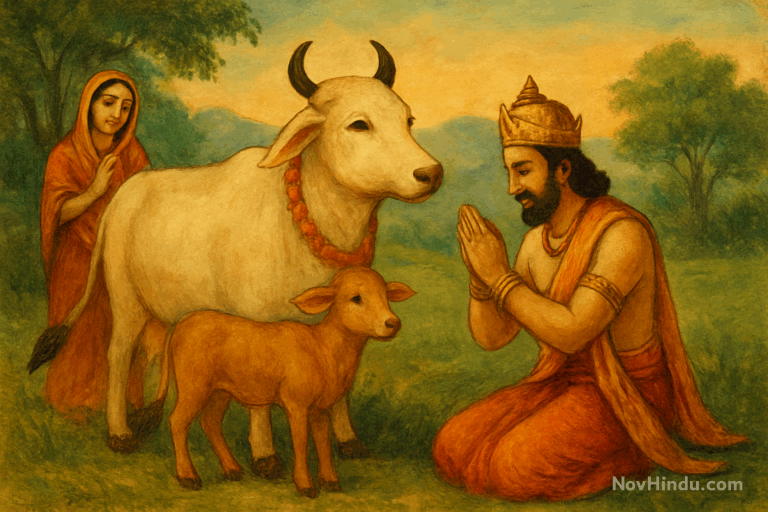Among the countless characters of the Mahabharata, few inspire the level of awe and reverence that Bhishma does. His very name has become synonymous with unshakable willpower, iron-clad vows, and unmatched loyalty to dharma. Yet, few pause to ask: Bhishma was not always called Bhishma. He was born as Devavrata — the crown prince of Hastinapur, the son of King Shantanu and the river goddess Ganga. So what happened that this noble prince was given a new name, one that would echo through history?
To understand this transformation, we must return to the early days of the Kuru dynasty, when a single decision changed the course of the epic.
The Prince Who Had Everything
Devavrata was not just another royal child. Born of divine parentage, he possessed beauty, wisdom, and unmatched skill in warfare. His education was entrusted to none other than Sage Parashurama, one of the greatest warriors to ever live. By the time he was a young man, he had mastered every known art — from statecraft to archery, from scriptures to diplomacy. The people of Hastinapur saw him as the perfect heir, a prince destined to rule with fairness and strength.
King Shantanu adored his son, and for years, everything in the kingdom seemed settled. But destiny rarely leaves great lives untouched.
The King Falls in Love
One day, while riding by the Yamuna River, King Shantanu encountered a woman of striking beauty and grace. She was Satyavati, the daughter of a fisherman. Her charm captivated him instantly. The king approached her father to ask for her hand in marriage.
The fisherman, however, had a condition — one that would shake the future of the Kuru dynasty.
He said, “If my daughter is to be queen, her sons must inherit the throne of Hastinapur.”
The Unthinkable Dilemma
This condition struck at the very heart of the king. He already had a son — Devavrata — who was the rightful heir. Shantanu could not bring himself to disinherit his beloved child. Unable to fulfill the fisherman’s demand, the king returned to his palace with a heavy heart.
Devavrata soon noticed his father’s melancholy. His sharp instincts told him something was amiss. After much persuasion, the king’s attendants revealed the truth — Shantanu longed for Satyavati but was bound by the impossible demand of her father.
A Vow That Changed History
Determined to remove his father’s sorrow, Devavrata rode to the fisherman’s home. There, he declared that he would renounce his claim to the throne so that Satyavati’s future children could rule. This was already a great sacrifice — no crown prince had ever given up his birthright so selflessly.
But the fisherman still hesitated. “What if your children one day challenge my daughter’s sons?” he asked.
In that moment, Devavrata made a vow so severe, so absolute, that it shook the very heavens:
He swore lifelong celibacy — never to marry, never to father children. This ensured that there would be no descendants to threaten Satyavati’s line.
His words were so firm, his resolve so unbreakable, that the gods themselves looked on in awe.
The Birth of the Name ‘Bhishma’
It was at that moment that the heavens thundered and divine flowers rained upon him. From above, a voice proclaimed:
“This is a terrible and extraordinary vow (Bhishma Pratigya). From this day forth, Devavrata shall be known as Bhishma — the one who made the most fearsome of promises.”
The name stuck, and it became more than just a label. It became his identity — the very essence of who he was. Every act of his life thereafter would reflect the same discipline, sacrifice, and adherence to dharma that the vow represented.
The Weight of His Vow
Bhishma’s oath, while noble, was also a chain he would carry all his life. His loyalty to the throne of Hastinapur bound him to serve as a guardian to generations of kings — some wise, others weak, and some deeply flawed. Through political storms and moral dilemmas, he never broke his word.
The vow that earned him his name was also the reason he could never take certain actions, even when they might have prevented tragedy. It is this bittersweet complexity that makes Bhishma one of the most fascinating characters in the Mahabharata.
Why This Story Still Matters
The tale of how Devavrata became Bhishma is more than an episode from an ancient epic. It is a reflection on the nature of sacrifice, the cost of keeping one’s word, and the thin line between duty and personal happiness.
In today’s world, where promises are easily broken and self-interest often rules, Bhishma’s story is a reminder of the power of integrity — but also a caution about the weight of unyielding vows.
Bhishma was not just a man; he was a promise made flesh. And that promise began on the banks of the Yamuna, with a son willing to give up everything for his father.
Discover more from Nav Hindu
Subscribe to get the latest posts sent to your email.







